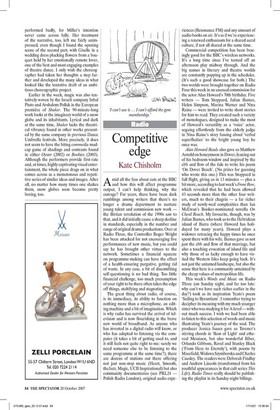Competitive edge
Kate Chisholm Amid all the fuss about cuts at the BBC and how this will affect programme output, I can't help thinking, why the outrage? For years, there have been dark rumblings among writers that there's no longer a drama department to nurture young talent and commission new work — the Birtian revolution of the 1990s saw to that, and it did initially cause a sharp decline in standards, especially in the number and range of original drama productions. Over at Radio Three, the Controller Roger Wright has been attacked for not encouraging live performances of new music, but you could say he has brought other virtues to the network. Sometimes a financial squeeze on programme-making can have the effect of a health-ensuring purgative, getting rid of waste. In any case, a bit of discomfiting self-questioning is no bad thing. Too little financial challenge, too much presumption of your right to be there often takes the edge off things, stultifying and stagnating.
The great thing about radio, of course, is its immediacy, its ability to function on nothing more than a microphone, an editing machine and a bit of imagination. Which is why radio has survived the arrival of television and is now flourishing in the brave new world of broadband. As anyone who has invested in a digital radio will know, or who has adapted to listening via the computer (it takes a bit of getting used to, and it still feels not quite right to me: surely we need someone else to be listening to the same programme at the same time?), there are dozens of stations out there offering not just non-stop music (Heart, Smooth, theJazz, Magic, UCB Inspirational) but also community documentaries (see PRL24 — Polish Radio London), original audio experiences (Resonance FM) and any amount of audio books on air. It's as if we're experiencing a renewed enthusiasm for a shared aural culture, if not all shared at the same time.
Commercial competition has been bracingly good for the BBC's wireless networks. It's a long time since I've turned off an afternoon play midway through. And the big names in literary and theatre worlds are constantly popping up in the schedules. (It's such a good showcase for both.) The two worlds were brought together on Radio Four this week in an unusual commission for the actor Alan Howard's 70th birthday. Five writers — Tom Stoppard, Julian Barnes, Helen Simpson, Marina Warner and Nina Raine — were invited to write short stories for him to read. They created such a variety of monologues, designed to make the most of Howard's versatility as a 'voice' actor, seguing effortlessly from the elderly judge in Nina Raine's story fussing about 'verbal superfluities' to the bright young boy he once was.
Alan Howard Reads also gave us Matthew Arnold on honeymoon in Dover, leaning out of his bedroom window and inspired by the ebb and flow of the tide to write his poem 'On Dover Beach'. (No prizes for guessing who wrote this one.) This was Stoppard in full flight, giving us in 13 minutes — plus a bit more, according to last week's Front Row, which revealed that he had been allowed 43 seconds more than the other four writers, much to their chagrin — a far richer study of newly-wed complexities than Ian McEwan's Booker-nominated novella On Chesil Beach. My favourite, though, was by Julian Barnes, who took us to the Hebridean island of Barra (where Howard has holidayed for many years). Howard plays a widower retracing the happy times he once spent there with his wife. Barnes gave us not just the ebb and flow of that marriage, but also a touching evocation of island life and why those of us lucky enough to have visited the Western Isles keep going back. It's not just the untamed landscape, but also the sense that here is a community untainted by the cheap values of metropolitan life.
This week's Words and Music on Radio Three (on Sunday night, and far too late: why can't we have such riches earlier in the day?) took as its inspiration Yeats's poem 'Sailing to Byzantium'. I remember trying to decipher its meaning with my much younger sister who was studying it for A-level — without much success. I wish we had been able to listen to this selection of words and music illustrating Yeats's journey of the soul. The producer Jessica Isaacs gave us Tavener's stirring chords in 'Ikon of Light' and ethereal Messiaen, but also wonderful Biber, Orlando Gibbons, Ravel and Stanley Black (From Here to Eternity'), with poems by Masefield, Wislawa Szymborska and Charles Causley. The readers were Deborah Findlay and Andrew Lincoln (transformed from his youthful appearances in that cult series This Life). Radio Times really should be publishing the playlist in its Sunday-night billings.







































































 Previous page
Previous page